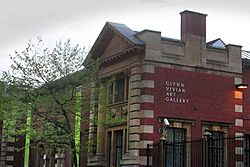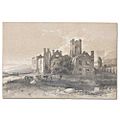Glynn Vivian Art Gallery facts for kids
| Oriel Gelf Glynn Vivian | |
 |
|
| Lua error in Module:Location_map at line 420: attempt to index field 'wikibase' (a nil value). | |
| Established | 1911 |
|---|---|
| Location | Swansea, Wales |
| Key holdings | Correggio Gustave Doré John Constable Ben Nicholson Barbara Hepworth John Piper Kyffin Williams Paul Nash Wyndham Lewis Franz Anton Bustelli |
| Collections | British and European old masters, Surrealist, and Impressionist |
| Visitors | 42,682 (2017) |
| Founder | Glynn Vivian |
The Glynn Vivian Art Gallery is a public art gallery in Swansea, Wales, in the United Kingdom. It's a place where you can see many different kinds of art. The gallery is located on Alexandra Road, close to Swansea railway station.
Contents
A Look Back: The Gallery's History
How the Gallery Started
The Glynn Vivian Art Gallery exists thanks to a generous person named Glynn Vivian. In 1905, he offered his amazing collection of paintings, drawings, and china to the city of Swansea. He also gave £10,000 to help build the gallery.
Glynn Vivian himself laid the first stone for the building in 1909. Sadly, he passed away before it was finished. The gallery officially opened in 1911 with much excitement. The building was designed in a grand style called Edwardian Baroque.
Early Days and Growth
The first director of the gallery was William Grant Murray. He was also the director of the Swansea Art School. Since 1951, the gallery has had its own special curator, who is like a manager for the art.
Glynn Vivian's original collection was very varied. Over time, the gallery received more donations. These included prints and drawings from the Deffett Francis collection. They also got Swansea china from the Kildare S. Meager gift. The gallery also buys new art. This has made its collection even more diverse, showing art from all over Europe. It also has many works by local Welsh artists. The gallery often hosts special art shows and educational programs too.
Big Changes: The 2011 Refurbishment
Why the Gallery Closed for a While
In October 2011, the gallery closed its doors for a big renovation project. This project cost £6 million! The plan was to update the building and fix a part that was added in 1974. While the gallery was closed, they still held art activities in other places around Swansea.
The Reopening
The former head of the Arts Council of Wales said that the Glynn Vivian is a very important place for the city. It is the only art gallery in Wales built just for art that is still open. People in Swansea missed it while it was closed. The renovation work took longer than planned because the original construction company had problems. But finally, the building reopened in 2016, looking brand new!
Exploring the Art Collection
What You Can See Inside
The Glynn Vivian Art Gallery shows a wide range of visual arts. Many pieces came from the original gift by Glynn Vivian (1835–1910). You can see works by famous "Old Masters" (artists from long ago). There is also a large international collection of porcelain and special Swansea china.
Paintings and Drawings
The gallery has paintings by many well-known artists. These include Richard Wilson, Claude Monet, Thomas Jones, and Augustus John. You can also find works by Gwen John, Stanley Spencer, and Kyffin Williams.
If you like prints, you can see works by Albrecht Dürer and William Blake. The collection of watercolours and drawings includes art by Thomas Gainsborough and John Sell Cotman.
Porcelain and Glass
The gallery has a huge collection of Swansea porcelain and china. These are beautiful items made in Swansea. They also have special pieces from other British and European factories. You can also see British and French glass. One very old and special item is a Meissen experimental vase. It is one of the earliest examples of European porcelain ever made.
-
La Sainte Trinite by Gustave Doré
-
Ecce Homo by Gustave Doré
-
La folie by Gustave Doré
-
The Nun by Gwen John
-
Ruined Buildings in Naples by Thomas Jones
 | Anna J. Cooper |
 | Mary McLeod Bethune |
 | Lillie Mae Bradford |













